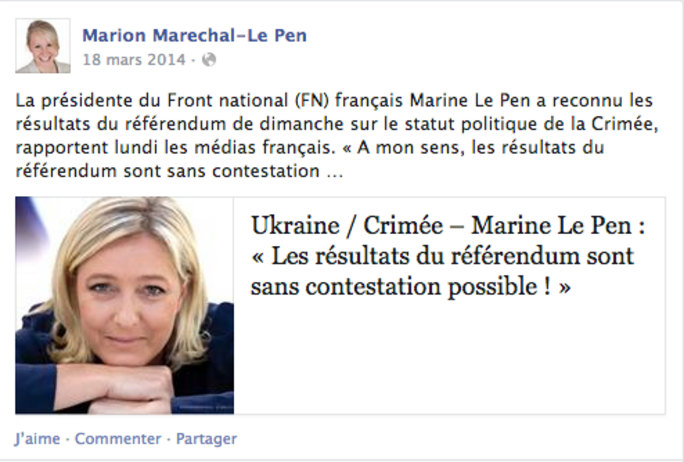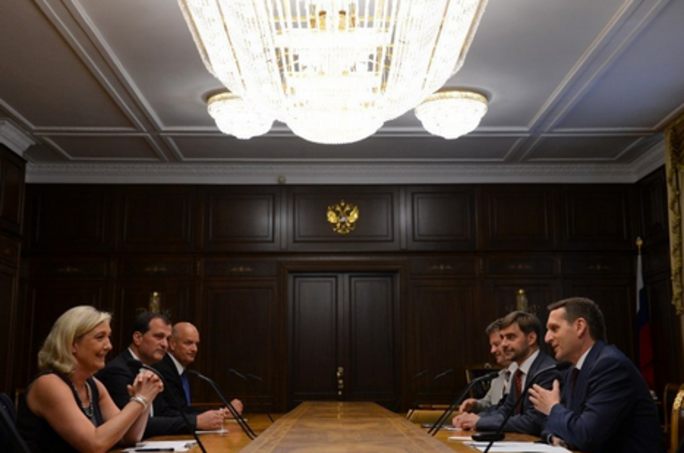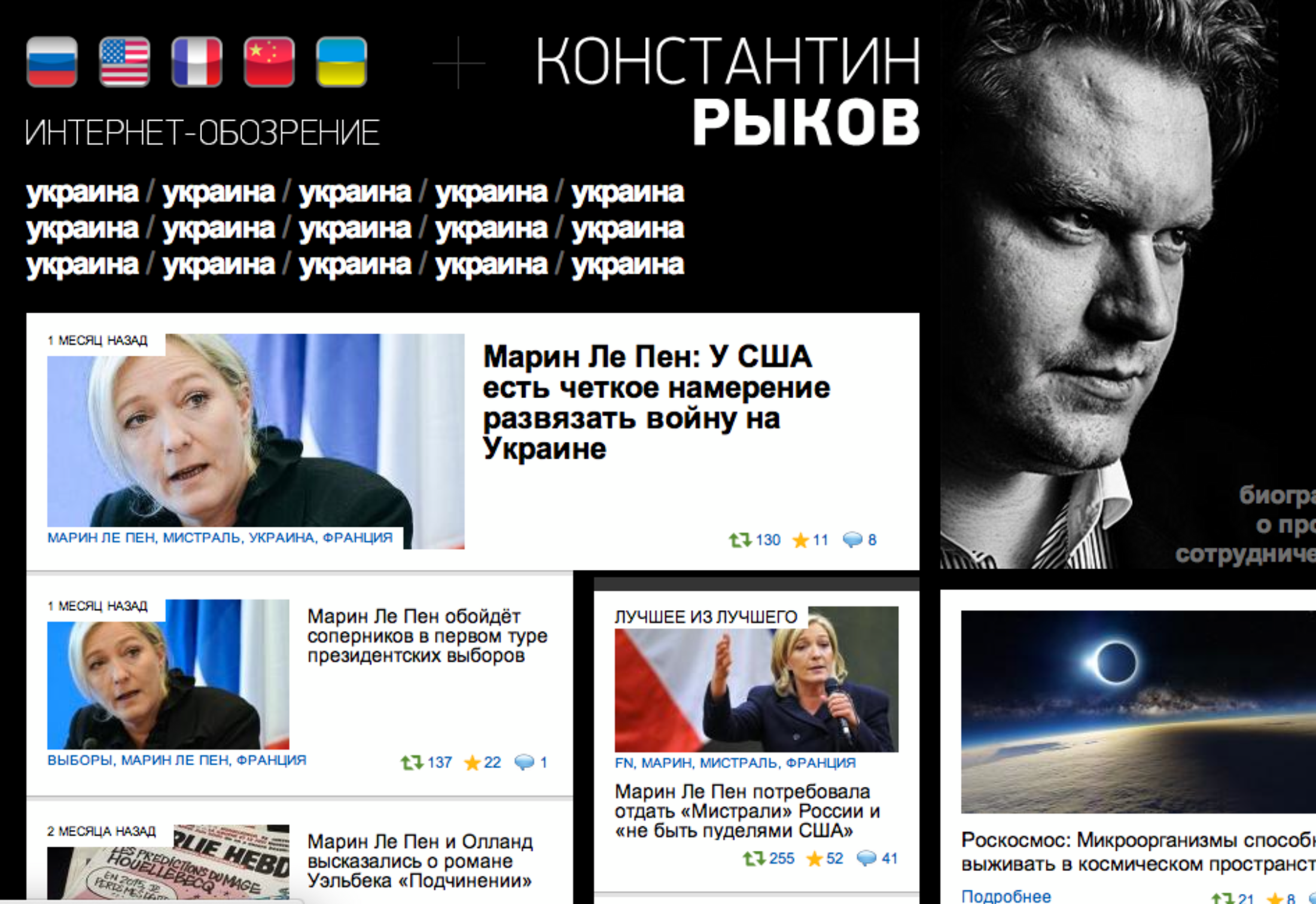The president of France's far-right National Front, Marine Le Pen, is mentioned in several text messages hacked from the mobile phone of a senior Kremlin official, Mediapart can reveal. These texts between two Russians date from March 2014 and refer to contacts between themselves and the FN over the official backing by the far-right French party of Russia's annexation of Crimea. The messages also include a reference to financial discussions.
On March 17th, 2014, Marine Le Pen officially gave her support to the results of the deeply controversial Crimean referendum backing annexation, while her official advisor on international affairs visited the region as an “observer”. In the hacked texts the Russians show their delight at these developments and discuss how to “thank the French” in “one manner or another”. Over the following months Marine Le Pen's FN and her father Jean-Marie Le Pen's micro party received loans from Russian banks totalling 11 million euros for party funding. The coincidence of the timing raises the question of whether the Russian loans were a form of quid pro quo for the FN's position on Crimea - an idea rejected by Marine Le Pen who says she knows neither of the two Russians concerned.

It was in February that the Russian internet group 'Anonymous International' revealed on their site Shaltay Boltay that they had launched a hack attack against Timur Prokopenko, a senior official at the Kremlin whose official title is deputy chief of the government's internal policy department. From the autumn of 2012 to December 2014 Prokopenko, a former co-president of the Young Guard, the youth wing of President Vladimir Putin's United Russia party, had responsibility for the media and the internet, working under the orders of Vyacheslav Volodin, the deputy chief of staff to the Russian presidency. The hack attack concerned both Prokopenko's mobile phone and his email account, with details of some of the messages – which relate to the period 2011 to 2014 – being made public.
On March 31st, 2014, the Shaltay Boltay website published a total of 40,000 SMS exchanges from Prokopenko's phone, and it was in these messages that the references to Marine Le Pen can be found. There seems little doubt about their authenticity; one of the recipients of Prokopenko's hacked texts, Nikolay Molibog, the chief executive officer of newspaper and television company RBC, has already confirmed on his Facebook page that the messages are genuine. There are also 66 emails that mention the Front National and its support for Russia, but it is the text messages which are the most intriguing.
The SMS messages were written in March 2014 as preparations were being made for the referendum that was used to justify Russian annexation of Crimea and which was held on March 16th. The person Prokopenko is texting is identified only as 'Kostia'. According to Anonymous International he is Konstantin Rykov, an active blogger, user of Twitter and creator of websites in the Putin cause. He was also an MP in Russia's State Duma from 2007 to 2012, representing the United Russia party.
The first exchange of texts
Timur Prokopenko texted 'Kostia' on March 10th, 2014. He asks him if he can get Marine Le Pen to come to Crimea as an “observer” of the referendum that was being held six days later. “We really need it. I told my boss that you were in contact with her????,” writes Prokopenko. “Yes, I'll try and find out tomorrow,” replies Kostia.

Enlargement : Illustration 2

Second exchange
The following day Prokopenko chases 'Kostia', who comes back with good news.
15.17: Kostia, get back to me
15.20: About Marine. It's the campaign for the local elections. She's out campaigning. Today or tomorrow the Front National will officially adopt its position on Crimea. We'll know then if she is prepared (which is unlikely) to come to Crimea or if one of her deputies will come. I'll have the details this evening...
15.22: Oh! That's great. We can convince them...
15.22: About the funding no.
15.23: Thanks very much, the ministry of foreign affairs will discuss it with her again.
15.23: She's spoken to Philippo [editor's note, Florian Philippot, vice-president of the FN] He's thinking about it)))
15.23: Has someone from the fund contacted you about the funding?
15.24: Yes the vice-minister for foreign affairs will telephone.
15.25: We also have the support of the Danish but I can't discuss it with them. I don't speak their language ;(

Enlargement : Illustration 3

Third exchange
On March 17th, the day after the referendum, the two men again swap texts:
15.49: Marine Le Pen has officially recognised the results of the referendum in Crimea!
15.51: She hasn't disappointed us ;)
15.57: The French need to be thanked in one manner or another.. It's important.
16.09: Yes, great!

Enlargement : Illustration 4

Loans for political services?
On March 17th, 2014, Marine Le Pen, who had indeed been out campaigning for the local elections, at Saint-Gilles in the Gard in the south of France, spoke about Crimea during a press conference. “In my view the results of the referendum can't possibly be disputed,” she said, adding that Crimea had only been part of Ukraine for 60 years. The FN's president called on the European Union – which said in a statement at the time that the vote was “illegal and illegitimate” - to show “consistency” in how it viewed the region. Her declaration was picked up by several FN websites and social media, particularly on the Facebook pages of MP Marion Maréchal-Le Pen (see below, right), and also on several Russian propaganda sites abroad.

The day before, Marine Le Pen's foreign affairs advisor Aymeric Chauprade, a key figure behind the party's link's with Russia, had been in Crimea as an “observer” of the referendum, invited by a pro-Russian organisation. He gave his own account of what he saw, which was widely published on FN and pro-Russian sites and which was “far removed from the propaganda of the Western media”, he said. As to his status in Crimea, his spokesman on March 13th had indicated that he went “as a geopolitical” expert but also “as Marine Le Pen's special advisor” as the FN “had for its part been invited”.
But the president of the FN herself had afterwards denied this to news agency AFP: “The FN is not sending an official observer.” According to the far-right magazine Minute, Florian Philippot had “bombarded” Marine Le Pen with calls “to make clear his fears and the negative nature of this trip”, and apparently convinced her not to send anyone officially.
However, on April 12th, 2014, Marine Le Pen herself went on a private visit to Moscow to meet the chairman of the State Duma Sergey Naryshkin, a close Putin ally whom she had already met in June 2013. As Mediapart has previously revealed, the FN funding association Cotelec, of which FN founder Jean-Marie Le Pen is president, received a loan of 2 million euros on April 18th, 2014, from a Cypriot company which is an offshoot of Russian state bank subsidiary VEB Capital. It was Aymeric Chauprade, the FN's 'observer' in Crimea, who was the intermediary for this first loan, which Jean-Marie Le Pen signed for on April 4th, 2014. This money was used by Cotelec to advance funds to the FN's candidates in the European elections, which took place in May 2014.
In September 2014 it was the turn of the FN's president, Marine Le Pen, to receive a 9-million-euro loan for the party from the First Czech Russian Bank, which is based in Moscow. The middleman on this occasion was far-right MEP Jean-Luc Schaffhauser. Were these loans provided in return for political services? What was the nature of the “thanks” that needed to be given “to the French”, as discussed in the text messages over the Crimean referendum?

Contacted via her private office and her director of communications, Marine Le Pen did not respond to Mediapart's questions. However, the FN leader later dismissed any claims of a quid pro quo involving the party's policy on Crimea and the loans in comments to news agency AFP, after Mediapart broke the story. “I don't see how Mediapart can infer that from what they have in front of them. This exchange, if it is genuine – it seems weird to me – shows that there is no quid pro quo. And you can't understand the conversation at all,” she told AFP. “This thing seems to me, at the least, to be suspect … I have never had the slightest contact either by telephone or in person with these persons who I don't know from Adam.”
The FN's treasurer Wallerand de Saint-Just, who signed the papers for the 9-million-euro loan, explained that he was “in no way aware of what had happened prior to [the signature]”. He said: “I don't know who Monsieur Prokopenko is. I don't have anything to do with Marine Le Pen's positions on international affairs. I just saw the bank's technical officials. I was told 'you're going to see these officials, you sign'.”
The loan middleman Jean-Luc Schaffhauser, meanwhile, said that “there was no political involvement”. While he knew who Timur Prokopenko was “because someone produced a file on him for me”, Schaffhauser insisted that in March 2014 “we were not in negotiations” with the Russians, before adding: “Well, not me in any case.” He continued: “The negotiations started in April, after the setback with an Abu Dhabi bank, which was supposed to lend us the money.”

Enlargement : Illustration 7

The far-right MEP says that he had himself turned down going to Crimea for the referendum. “They also invited me, Marine told me: 'You're not going.' She had a bad feeling about it, she told me: 'Imagine if there's a bloodbath'. I obeyed orders. Aymeric [Chauprade] went there in a personal capacity.” So how did he explain the Russians' text messages? “I think it was Aymeric who was involved,” said Schaffhauser. Aymeric Chauprade did not respond to Mediapart's calls.
Was Konstantin Rykov in direct contact with Marine Le Pen as he made out in the hacked SMS messages? He certainly does not hide his admiration for the president of the Front National, who is accorded iconic status on his website (see above right). The main man behind pro-Putin social media follows every move of the far-right French politician.
Rykov, who portrays himself as one of the great patriots of the Russian blogosphere, has close ties with France. In August 2014 the Russian political and financial activist Alexei Navalny revealed that Rykov and his parents own a luxury villa at Mougins near Cannes in southern France, which was bought for 2 million euros in December 2013. Some documents relating to its purchase have been published. It emerges from them that Rykov pays his taxes in France, where he is registered as “resident for the purpose of tax laws”. To obtain this status a person has to meet certain conditions. They either have to reside in France most of the time, or carry out their business there, or make the country the main focus of their economic activity, for example through investments or a business. Konstantin Rykov did not respond to Mediapart's request for a comment.
In addition to the discussions about Marine Le Pen, the phone and email messages hacked by Anonymous International shed light more generally on how the Kremlin operates, especially when it comes to the media, the internet and social networks. The first batch of 9,500 emails leaked on February 5th, 2015, were published by the group under the title: “Three years of life at the heart of a political department of the presidential administration: provocations, planted articles, control over the media and others”.
For example, the emails reveal how the activities of Alexei Navalny – who has become one of the main opposition figures in Russia – are followed step by step. They also show how pressure is applied to discredit opposition websites, to block access and to buy the cooperation of some journalists. Timur Prokopenko himself has not reacted to the leaks or denied that the messages are genuine.
The Shaltay Boltay website (the name means 'Humpty Dumpty') was launched in December 2013 and has been responsible fora number of revelations. Though the Anonymous International hackers behind it sometimes get paid for their services – and thus are being used by one group or another – the serious and genuine nature of the documents and photos they have published has never been called into question.
----------------------------------------------------------------------
- The French version of this article can be found here.
English version by Michael Streeter


